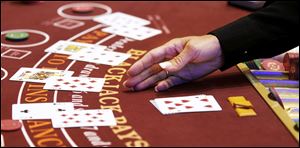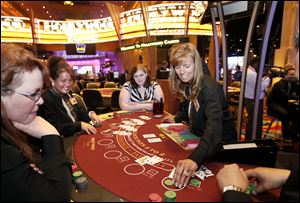
Card counters likely to tally up trouble at casinos
5/27/2012
Sue Utter practices dealing blackjack at Hollywood Casino Toledo. Experts say card counters and cheaters could target the casino.
the blade/dave zapotosky
Buy This Image

Hollywood Casino Toledo will watch for 'card counters,' gamblers who know how to beat the house.
When Hollywood Casino Toledo opens its doors to the public for the first time Tuesday, it hopes thousands of people pour in with cash to lose. But casino bosses also will be on the lookout for a different class of gamblers -- those who have proved they can beat the house.
They are simply called "card counters" by those in the gambling industry, and what they do is not illegal, but if they are spotted on the casino floor they'll be asked to leave.
RELATED CONTENT:
- Local police to step up patrols for casino's 1st days
- Toledo joins Ohio gaming boom
- Hollywood Casino: Facts and figures
"There's a whole lot of people doing it," said Beverly Griffin, president of Griffin Investigations, a Las Vegas company that runs a database of 7,000 names of cheaters and card counters to which casinos can subscribe. "Some make little amounts and come and go. It's the people who make the large amounts of money, it ends up causing attention."
Those with the rare talent of card counting can win big. A group of Massachusetts Institute of Technology students who outwitted casinos for millions of dollars in the 1990s were featured in the book Bringing Down the House and a Hollywood movie, 21.
One of those students, David Irvine, who now shows others tricks of the game at the Blackjack Institute, reported making $55,000 in a single hour during one of his first Las Vegas visits. Other veteran blackjack players offer online courses and videos to teach novices the art of card counting.
How it works
At the blackjack table, card counters know when the odds shift from the house's favor to theirs when they calculate a disproportionate number of high cards (10s through aces) left to be played. Then, the card players significantly increase their bets. Some card counters work in groups, with a player signaling to another to join a blackjack table when the odds are just right.

Sue Utter practices dealing blackjack at Hollywood Casino Toledo. Experts say card counters and cheaters could target the casino.
But card counting isn't considered illegal or cheating in Ohio, the state's casino control commission has ruled, similar to other places such as Nevada and Michigan.
"If someone is using their mental faculties, and they're able to use them to have an advantage, we do not consider that cheating," Matt Schuler, the Ohio casino commission's executive director, told The Blade on Friday.
Because card counters aren't breaking the state gambling laws, casinos turn to their own devices -- from an online database to high-level surveillance cameras and staff training -- to weed out those trying to beat the system at blackjack.
Keeping watch
Hundreds of casinos throughout the world subscribe to Griffin Investigations' database, which is composed of blacklisted gamblers' names, their photographs from surveillance cameras and mug shots, information on the crowd they gamble with, and which casinos threw them out.
"It's always been, in my opinion, no such thing as too much information," Ms. Griffin said, adding that casinos have the right to know who their customers are.
With the Griffin database, casinos can search for people by, say, estimated height, weight, age, and what games they play and then draw up a list of matches on the database to see if someone has a history of getting kicked out of casinos, Ms. Griffin said.
Surveillance teams also send photographs of suspected card counters in real time to Griffin investigators to verify identities, she said.
CARD COUNTING: HOW IT WORKS
The game of blackjack, or 21, is played between a player or multiple players and a casino dealer. The player is dealt an initial two cards with the option of drawing cards to bring the total value to 21 or less so that the dealer will lose by having a lesser hand than the player or by exceeding 21, known as busting.
Card counting is intended to give players an edge over the casino. There are various card-counting approaches, but perhaps the most common is known as the high-low system. It works like this:
High cards (10s through aces) are assigned a value of -1.
Low cards (2s through 6s) are assigned a value of +1.
7s, 8s, and 9s are considered neutral and are assigned a value of 0.
A card counter keeps a "running count" of all the cards that appear on the table, adding and subtracting as he goes. Higher counts mean more high cards are left in the dealer's shoe, consisting of six or eight decks in many casinos. Higher counts are believed to favor the player because the dealer, who must keep taking cards until his total is at least 17, is more likely to bust, or exceed 21.
Sounds easy, right?
Wrong.
Keeping track of cards quickly flowing across the blackjack table to several players plus the dealer doesn't come naturally. And even if a player can keep the running count of cards appearing, his calculations are not complete.
The running count must be converted to a "true count," which is arrived at by dividing the running count by the estimated number of decks remaining in the shoe. If the running count is +12 and two decks remain in the shoe, the true count would be +6.
The true count is used by the player to adjust the amount he is betting per hand based on the favorability of the remaining cards.
A single player raising and lowering bets based on the count might appear obvious to casino personnel, and that is why some groups adopted a team approach to card counting. Teams may use spotters playing low stakes to keep count at a table and then, when the count goes favorable, calling in a high-stakes player who bets big from the moment he joins the game.
Some casinos use surveillance cameras with face-detection technology to look for cheaters or card counters. But too often with that technology, the photos aren't clear, the angle isn't right, or casinos lack a strong enough database of their own to match a person's face with a name, she said.
"Biometrics becomes a much more fascinating story than the reality may warrant," agreed Alan Feldman, senior vice president of public affairs at MGM Grand Hotel & Casino executive in Las Vegas.
When the Hollywood Casino Toledo opens, hundreds of surveillance cameras will be turned on in the $320 million facility. But those cameras won't be equipped with biometric technology, said Bruce Loprete, the casino's security director. "You don't take pictures of everybody that comes in," he said.
Mr. Loprete said the Toledo casino has a method in place to keep track of problematic gamblers but added it did not involve his security department, so he could not speak to specifics. General Manager Richard St. Jean could not be reached for comment.
Keeping count
Despite the glamour and mystique of card counting, some industry experts say it isn't a frequent problem at casinos.
Craig Ghelfi, a former senior executive at both the Greektown Casino-Hotel and MotorCity Casino Hotel, said it was a rare issue at both Detroit venues because of the difficulty of counting cards at a table with six to eight decks in play.
"You really have to be on top of your game," he said. "There aren't as many people who are as proficient as you'd think."
Besides the Griffin database, casinos use other tactics to watch for card counting on the floor.
Pit managers and dealers -- with staff watching on surveillance cameras -- look at high-stakes players' behavior, for example, noticing if they double their bets when the cards are in their favor or cut back when they aren't, said Frank Fantini, publisher of Fantini Research, an online industry magazine.
Other suspected card counters might suddenly bet $500 after placing $5 bets all night, another suspicious sign, said Mr. Feldman.
New targets?
Several industry experts said the Toledo facility, a casino with rookie dealers opening in a state where the gambling industry is only a few weeks old, will be susceptible to card counters and professional gamblers looking to cheat the system.
"You can't take chances. There are people out there who are very good at what they do, and they will take advantage of you," Ms. Griffin said.
The experts stressed the importance of having good surveillance and floor supervisors to help the novice dealers, many of whom have never dealt cards in a casino.
"There's a learning curve for new dealers and a learning curve on a newly opened casino that has to be overcome in the first month and a half or two," said Mr. Ghelfi, now a casino consultant in Las Vegas. "They're going to start out with some fairly fresh dealers. I suspect the management and the surveillance is going to be on top of it from the start."
At the end of it all, blackjack is still a game of chance. "Just because you're counting doesn't mean you're necessarily going to win," Mr. Ghelfi said. "The cards are still cards and the cards are still random."'
Contact Gabrielle Russon at: grusson@theblade.com or 419-724-6026.